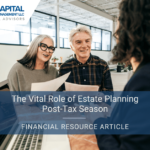Maximizing Returns while Minimizing Tax Liabilities
In the world of investing, it’s not just about how much you make, but also about how much you keep. That’s where tax-efficient investing comes into play. By strategically managing your investments, you can minimize the impact of taxes on your returns, leaving more money in your pocket. Let’s delve into the basics of tax-efficient investing and how it can benefit you.
Understanding Tax-Efficient Investing
Tax-efficient investing is all about structuring your investment portfolio in a way that helps you keep more of your investment gains by minimizing taxes. The goal is to maximize after-tax returns while still achieving your financial objectives. This involves choosing the right investment vehicles and employing strategies that can help reduce your tax liabilities.
Choosing the Right Investment Vehicles
One of the key components of tax-efficient investing is selecting investment vehicles that offer favorable tax treatment.
Here are a few options to consider:
- Retirement Accounts: Contributions to retirement accounts such as 401(k)s and IRAs can be tax-deductible, and investment gains within these accounts grow tax-deferred until withdrawal.
- Tax-Advantaged Accounts: Certain investment accounts, like Roth IRAs, allow for tax-free growth and withdrawals, provided certain conditions are met. Municipal bonds are another example of an investment that can provide tax-free income.
- Low-Turnover Funds: Mutual funds and exchange-traded funds (ETFs) with low turnover ratios tend to generate fewer taxable capital gains distributions, making them more tax-efficient than high-turnover funds.
Implementing Tax-Efficient Strategies
In addition to choosing the right investment vehicles, there are several strategies you can employ to optimize your tax situation:
- Tax-Loss Harvesting: This involves selling investments that have experienced losses to offset capital gains and reduce taxable income. These losses can be used to offset gains in the same year or carried forward to offset future gains.
- Asset Location: Placing tax-inefficient investments, such as bonds and real estate investment trusts (REITs), in tax-advantaged accounts, while holding tax-efficient investments like stocks in taxable accounts, can help minimize taxes.
- Long-Term Investing: Holding investments for the long term can qualify for lower capital gains tax rates, compared to short-term investments taxed at ordinary income rates.
Monitoring and Rebalancing
Regularly monitoring your investment portfolio and rebalancing as needed is essential for maintaining tax efficiency. Rebalancing involves adjusting your portfolio to maintain the desired asset allocation, which may involve selling assets that have appreciated and buying assets that have underperformed. By incorporating tax considerations into your rebalancing strategy, you can minimize the tax impact of portfolio adjustments.
Sound Financial Planning
Tax-efficient investing is a crucial component of a sound financial plan, helping you maximize your after-tax returns and achieve your long-term financial goals. By selecting the right investment vehicles, implementing tax-efficient strategies, and regularly monitoring your portfolio, you can minimize tax liabilities and keep more of your hard-earned money working for you. At Prism Capital Management, we’re committed to helping you navigate the complexities of tax-efficient investing and optimize your financial future.
Financial Services for Real People
Founded for the benefit of clients, Prism Capital Management is an independent Seattle and Skagit-based firm with a deep commitment to providing guidance that is free of conflicts of interest, based solely on the sum of our experience and expertise. We are committed to putting client interests first and to stewarding both wealth and well-being for those we serve. We have a singular measure of success: the results we get for our clients.
As an Investment Advisor, we have a fiduciary duty to act in YOUR best interest. From planning to investment management to advice on buying a car, we are your financial life partners.




